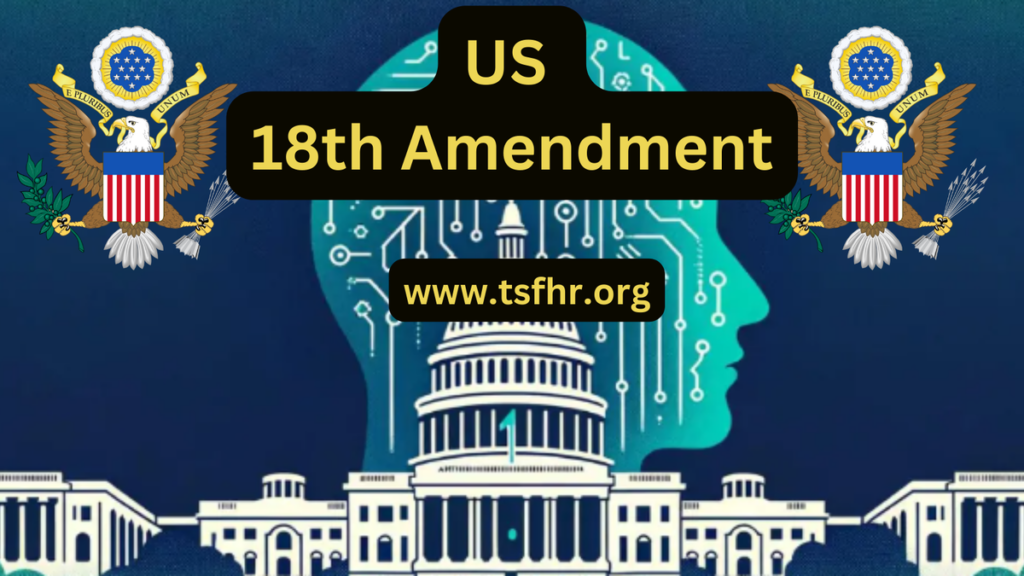What is the 18th Amendment in Simple Terms: Learn what the 18th Amendment means in simple terms. This article explains its creation, why it was important, and the impact of Prohibition on American society.
Introduction:
The 18th Amendment, ratified in 1919, marked a significant moment in U.S. history, as it introduced Prohibition. This amendment banned the manufacture, sale, and transportation of alcoholic beverages across the country. While it was intended to curb social problems associated with alcohol consumption, it led to a variety of unintended consequences. In this article, we will break down the 18th Amendment in simple terms, including why it was created, its importance, and the eventual repeal.
What is the 18th Amendment in Simple Terms:
What is the 18th Amendment in Simple Terms?
The 18th Amendment to the U.S. Constitution, ratified in 1919, banned the production, sale, and transportation of alcoholic beverages in the United States. It was part of the Prohibition movement, which aimed to reduce crime, corruption, and social problems related to alcohol consumption.
When Was the 18th Amendment Created?
- The 18th Amendment was ratified on January 16, 1919, and went into effect on January 17, 1920.
- It was the result of a long-standing campaign led by temperance groups, which argued that alcohol was the cause of many societal issues, including domestic violence and poverty.
Why Was the 18th Amendment Created?
- The 18th Amendment was created to address the social problems that many believed were caused by alcohol.
- Temperance movements in the U.S. advocated for the prohibition of alcohol, claiming it led to domestic abuse, crime, and poverty.
- The goal was to improve public health, reduce crime, and strengthen families by eliminating alcohol consumption.
Why is the 18th Amendment Important?
- The 18th Amendment is important because it represents a time in U.S. history when the government attempted to control social behavior on a national scale.
- It also highlights the challenges of enforcing moral laws and the unintended consequences that can arise when such laws are enacted.
- The amendment was eventually repealed by the 21st Amendment in 1933, marking the end of Prohibition.
18th Amendment Rights
While the 18th Amendment itself does not grant specific rights to individuals, it significantly altered the rights related to alcohol consumption in the U.S. It restricted the production, sale, and transportation of alcohol, which led to a period of legal and illegal alcohol trade during Prohibition.
18th Amendment Examples
- Prohibition Era: The most direct example of the 18th Amendment in action was the nationwide ban on alcohol. This led to the rise of illegal speakeasies (secret bars) and bootlegging operations.
- Impact on Organized Crime: The 18th Amendment indirectly contributed to the rise of organized crime, as criminal groups took advantage of the demand for illegal alcohol.
Examples of the 18th Amendment Being Violated
- Speakeasies: Secret bars that operated illegally during Prohibition, where people could drink alcohol despite the ban.
- Bootlegging: The illegal production and distribution of alcohol, which became widespread during Prohibition. Organized crime syndicates like those led by Al Capone profited from bootlegging.
FAQs Section:
Q1: What is the 18th Amendment in Simple Terms for Kids?
The 18th Amendment made it illegal to make, sell, or drink alcohol in the United States. This was supposed to help stop bad things like fighting and poverty caused by alcohol, but it didn’t work as planned.
Q2: What Does the 18th Amendment Say in Simple Words?
The 18th Amendment says that alcohol can’t be made, sold, or transported in the U.S. This law was meant to help stop problems caused by drinking, but it led to illegal drinking and crime.
Q3: Why Was the 18th Amendment Created?
The 18th Amendment was created to stop alcohol from causing problems in society, such as fights, poverty, and crime. Many people believed that banning alcohol would make society better.
Q4: What is the 18th Amendment of the Bill of Rights in Simple Terms?
The 18th Amendment is not part of the Bill of Rights, but it’s a constitutional amendment that banned alcohol in the U.S. It was later repealed because it caused more problems than it solved.
Q5: What Are Some 18th Amendment Examples?
Speakeasies: Secret places where people went to drink alcohol illegally during Prohibition.
Bootlegging: The illegal production and sale of alcohol, which became a huge business during Prohibition.
Conclusion:
The 18th Amendment, which ushered in Prohibition in the U.S., was meant to reduce the social problems caused by alcohol. However, it had unintended consequences, including the rise of illegal alcohol trade and organized crime. The amendment was ultimately repealed by the 21st Amendment in 1933, marking the end of Prohibition. Understanding the 18th Amendment helps us appreciate the challenges of trying to regulate personal behavior and the importance of law enforcement in maintaining order.
Other Amendments Articles
